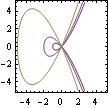| |
 
UNT
and TAMU Workshop on Algebras
Saturday, April 23, 2011
University of North Texas, Denton, Texas
We will meet for coffee/tea in General
Academic Building (GAB) Room 472 at 8:45 AM on
Saturday, April 23rd. Talks will be held in GAB Room
406.
Parking
Here is an interactive mapof
the Denton campus. Parking Recommendation: Parking in Lot
10 at the corner of West Hickory and Ave C. Parking is not
enforced on the weekend, so you may park in this lot without a visitor
pass.
Program
- 9:00-9:20
Jeanette Shakalli (TAMU): Universal
Deformation Formulas
- In 1998,
Giaquinto and Zhang developed the theory of universal deformation
formulas based on a bialgebra B. Such a formula is universal in the
sense that it applies to any B-module algebra to yield a formal
deformation. In this short talk, I will define the formal deformation
of an algebra and the universal deformation formula. Then I will
present a deformation formula derived from the action of a Hopf
algebra, which was obtained by Witherspoon in 2006, and illustrate this
concept by giving an example.
- 9:40-10:00 Philip Puente (UNT): Restricted Lie Algebras in Positive Characteristic
- In this talk, we consider deformations of polynomial rings in positive
characteristic with a view toward their centers. We define a
restricted Lie Algebra which gives rise to a special type of deformation, in which the commutator of two elements in a
vector space is replaced with a linear term. We give some concrete
examples and examine centers that arise.
- 10:20-10:40 Christine Uhl (UNT): Groups Acting on Restricted Lie Algebras and Centers of Deformations
- In this talk, we will look at skew group algebras formed by a finite
group acting on a restricted Lie Algebra. We give some concrete
examples with an eye toward computing the centers of these algebras.
- 11:00-11:20
Deepak Naidu (TAMU): Quantum Drinfeld Hecke Algebras
- Let G
be a group acting on the quantum
symmetric algebra
Sq(V).
I will introduce the quantum Drinfeld Hecke Algebras. These objects
manifest themselves as certain types of deformations of the skew group
algebras
Sq(V)#G.
I will present examples arising from the symmetric groups.
- 11:40-12:00 Briana Foster-Greenwood (UNT): Invariant Theory and Hochschild Cohomology of Skew Group Algebras
- Hochschild cohomology abstractly measures when and how one can deform the
multiplication in an algebra while maintaining associativity. In the context of
skew group algebras S(V)#G (combining a group G with a polynomial ring S(V) on
which the group acts), Shepler and Witherspoon give an invariant theoretic
formulation of the Hochschild cohomology groups. With an eye towards
deformations of S(V)#G for G a tetrahedral complex reflection group, I will
highlight some tools from invariant theory (e.g. characters and Molien series)
useful in computing Hochschild cohomology of skew group algebras.
Lunch

- 2:00-2:20
Van Nguyen (TAMU): Cohomology of
Hopf Algebras
- Conjecture: "The cohomology of a finite dimensional
Hopf Algebra is finitely generated." This statement is still an open
question. However, there are several modified cases when it is known
true. In this talk, I will introduce some basic concepts in homological
algebra, mainly focus on examples of cohomology of an augmented
algebra, cohomology of finite groups (as we recall kG is a Hopf
Algebra). After that, we will look at some conditions for a Hopf
Algebra A such that H*(A) is finitely generated.
- 2:40-3:00
Piyush Shroff (TAMU): Cohomology of Quotients of
Quantum Symmetric Algebra
- Let
A=B/(x_1^{N_1},...,x_r^{N_r}) where B is PBW algebra. My goal is to
show that Ext_A^{*}(k,k) = H^{*}(A,k) is finitely generated. In this
talk I will give some basic definitions and show that H^{*}(S,k) is
finitely generated with the help of techniques of Mastnak, Pevtsova,
Schauenburg and Witherspoon where S is quotient of quantum symmetric
algebra.
- 3:20-3:40 Rabin Dahal (UNT): Representations of sl(2)
- We will give an introduction to finite dimensional representations of the Lie
algebra sl(2), including their semisimplicity and the classification of the
irreducible representations. Time permitting, we will discuss tensor products
and the universal enveloping algebra.
- 4:00-4:20
Jeannette Larsen (UNT): Tensor Density Representations and Length Two Representations of Vec R
- In this talk we will
discuss the Lie algebra Vec R, its subalgebra a, and the tensor density representations of VecR of the type (πλ , F (λ))
for λ a complex number. I will show when
such representations are irreducible and when they are equivalent (as both VecR and a representations). We will then extend to VecR representations of length two, built
out of the above length-one representations, and examine the cohomology of
these length-two representations, particularly in the case when they are a-relative.
- 4:40-5:00 Jose Franco (Baylor): Global SL(2,R) representations of the Schrodinger equation with time-dependent
potentials.
- We study the representation theory of the solution space of the one-dimensional
Schrodinger equation with time-dependent potentials that posses
sl(2,R)-symmetry. We give explicit local intertwining maps to multiplier
representations and show that the study of the solution space for potentials of
the form V(t,x)=g_2(t)x^2+g_1(t)x+g_0(t) reduces to the study of the potential
free case. We also show that the study of the time-dependent potentials of the
form V(t,x)= c x^(-2)+g_2(t)x^2+g_0(t) reduces to the study of the potential
V(t,x)=c x^(-2). Therefore, we study the representation theory associated to
solutions of the Schrodinger equation with this potential. The subspace of
solutions for which the action globalizes is constructed via nonstandard
induction outside the semisimple category.
Dinner at 6:00
Restaurants
Local
Hotels
|
|